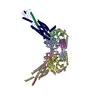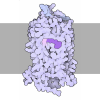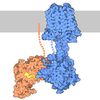+ Open data
Open data
- Basic information
Basic information
| Entry | Database: PDB / ID: 8hao | ||||||
|---|---|---|---|---|---|---|---|
| Title | Human parathyroid hormone receptor-1 dimer | ||||||
 Components Components |
| ||||||
 Keywords Keywords | LIPID BINDING PROTEIN/HORMONE/IMMUNE SYSTEM / PTH1R / GPCR / LIPID BINDING PROTEIN-HORMONE-IMMUNE SYSTEM complex | ||||||
| Function / homology |  Function and homology information Function and homology informationmacromolecule biosynthetic process / parathyroid hormone receptor binding / type 1 parathyroid hormone receptor binding / negative regulation of bone mineralization involved in bone maturation / positive regulation of osteoclast proliferation / negative regulation of apoptotic process in bone marrow cell / response to parathyroid hormone / positive regulation of cell proliferation in bone marrow / hormone-mediated apoptotic signaling pathway / parathyroid hormone receptor activity ...macromolecule biosynthetic process / parathyroid hormone receptor binding / type 1 parathyroid hormone receptor binding / negative regulation of bone mineralization involved in bone maturation / positive regulation of osteoclast proliferation / negative regulation of apoptotic process in bone marrow cell / response to parathyroid hormone / positive regulation of cell proliferation in bone marrow / hormone-mediated apoptotic signaling pathway / parathyroid hormone receptor activity / magnesium ion homeostasis / positive regulation of signal transduction / response to fibroblast growth factor / cAMP metabolic process / phosphate ion homeostasis / Class B/2 (Secretin family receptors) / G protein-coupled peptide receptor activity / negative regulation of chondrocyte differentiation / osteoblast development / response to vitamin D / Activation of G protein gated Potassium channels / G-protein activation / G beta:gamma signalling through PI3Kgamma / Prostacyclin signalling through prostacyclin receptor / G beta:gamma signalling through PLC beta / ADP signalling through P2Y purinoceptor 1 / Thromboxane signalling through TP receptor / Presynaptic function of Kainate receptors / G beta:gamma signalling through CDC42 / Inhibition of voltage gated Ca2+ channels via Gbeta/gamma subunits / G alpha (12/13) signalling events / Glucagon-type ligand receptors / G beta:gamma signalling through BTK / ADP signalling through P2Y purinoceptor 12 / Adrenaline,noradrenaline inhibits insulin secretion / Cooperation of PDCL (PhLP1) and TRiC/CCT in G-protein beta folding / Ca2+ pathway / Thrombin signalling through proteinase activated receptors (PARs) / G alpha (z) signalling events / Extra-nuclear estrogen signaling / G alpha (s) signalling events / G alpha (q) signalling events / G alpha (i) signalling events / peptide hormone receptor binding / Glucagon-like Peptide-1 (GLP1) regulates insulin secretion / positive regulation of inositol phosphate biosynthetic process / High laminar flow shear stress activates signaling by PIEZO1 and PECAM1:CDH5:KDR in endothelial cells / Vasopressin regulates renal water homeostasis via Aquaporins / bone mineralization / peptide hormone binding / chondrocyte differentiation / positive regulation of glycogen biosynthetic process / bone resorption / positive regulation of bone mineralization / G protein-coupled receptor signaling pathway, coupled to cyclic nucleotide second messenger / response to cadmium ion / cell maturation / Rho protein signal transduction / homeostasis of number of cells within a tissue / positive regulation of D-glucose import across plasma membrane / skeletal system development / hormone activity / response to lead ion / adenylate cyclase-modulating G protein-coupled receptor signaling pathway / adenylate cyclase-activating G protein-coupled receptor signaling pathway / intracellular calcium ion homeostasis / cellular response to catecholamine stimulus / adenylate cyclase-activating dopamine receptor signaling pathway / cell-cell signaling / G-protein beta-subunit binding / cellular response to prostaglandin E stimulus / heterotrimeric G-protein complex / regulation of gene expression / response to ethanol / basolateral plasma membrane / G alpha (s) signalling events / phospholipase C-activating G protein-coupled receptor signaling pathway / in utero embryonic development / transcription by RNA polymerase II / cell surface receptor signaling pathway / receptor complex / cell population proliferation / apical plasma membrane / receptor ligand activity / G protein-coupled receptor signaling pathway / response to xenobiotic stimulus / negative regulation of cell population proliferation / negative regulation of gene expression / GTPase activity / positive regulation of cell population proliferation / positive regulation of gene expression / nucleolus / protein homodimerization activity / positive regulation of transcription by RNA polymerase II / extracellular space / extracellular region / nucleus / membrane / plasma membrane / cytosol Similarity search - Function | ||||||
| Biological species |   synthetic construct (others)  Homo sapiens (human) Homo sapiens (human) | ||||||
| Method | ELECTRON MICROSCOPY / single particle reconstruction / cryo EM / Resolution: 3.76 Å | ||||||
 Authors Authors | Zhao, L. / Xu, H.E. / Yuan, Q. | ||||||
| Funding support |  China, 1items China, 1items
| ||||||
 Citation Citation |  Journal: Acta Pharmacol Sin / Year: 2023 Journal: Acta Pharmacol Sin / Year: 2023Title: Molecular recognition of two endogenous hormones by the human parathyroid hormone receptor-1. Authors: Li-Hua Zhao / Qing-Ning Yuan / An-Tao Dai / Xin-Heng He / Chuan-Wei Chen / Chao Zhang / You-Wei Xu / Yan Zhou / Ming-Wei Wang / De-Hua Yang / H Eric Xu /   Abstract: Parathyroid hormone (PTH) and PTH-related peptide (PTHrP) are two endogenous hormones recognized by PTH receptor-1 (PTH1R), a member of class B G protein- coupled receptors (GPCRs). Both PTH and ...Parathyroid hormone (PTH) and PTH-related peptide (PTHrP) are two endogenous hormones recognized by PTH receptor-1 (PTH1R), a member of class B G protein- coupled receptors (GPCRs). Both PTH and PTHrP analogs including teriparatide and abaloparatide are approved drugs for osteoporosis, but they exhibit distinct pharmacology. Here we report two cryo-EM structures of human PTH1R bound to PTH and PTHrP in the G protein-bound state at resolutions of 2.62 Å and 3.25 Å, respectively. Detailed analysis of these structures uncovers both common and unique features for the agonism of PTH and PTHrP. Molecular dynamics (MD) simulation together with site-directed mutagenesis studies reveal the molecular basis of endogenous hormones recognition specificity and selectivity to PTH1R. These results provide a rational template for the clinical use of PTH and PTHrP analogs as an anabolic therapy for osteoporosis and other disorders. | ||||||
| History |
|
- Structure visualization
Structure visualization
| Structure viewer | Molecule:  Molmil Molmil Jmol/JSmol Jmol/JSmol |
|---|
- Downloads & links
Downloads & links
- Download
Download
| PDBx/mmCIF format |  8hao.cif.gz 8hao.cif.gz | 418.5 KB | Display |  PDBx/mmCIF format PDBx/mmCIF format |
|---|---|---|---|---|
| PDB format |  pdb8hao.ent.gz pdb8hao.ent.gz | 339 KB | Display |  PDB format PDB format |
| PDBx/mmJSON format |  8hao.json.gz 8hao.json.gz | Tree view |  PDBx/mmJSON format PDBx/mmJSON format | |
| Others |  Other downloads Other downloads |
-Validation report
| Arichive directory |  https://data.pdbj.org/pub/pdb/validation_reports/ha/8hao https://data.pdbj.org/pub/pdb/validation_reports/ha/8hao ftp://data.pdbj.org/pub/pdb/validation_reports/ha/8hao ftp://data.pdbj.org/pub/pdb/validation_reports/ha/8hao | HTTPS FTP |
|---|
-Related structure data
| Related structure data |  34598MC  8ha0C  8hafC M: map data used to model this data C: citing same article ( |
|---|---|
| Similar structure data | Similarity search - Function & homology  F&H Search F&H Search |
- Links
Links
- Assembly
Assembly
| Deposited unit | 
|
|---|---|
| 1 |
|
- Components
Components
-Guanine nucleotide-binding protein ... , 3 types, 6 molecules ACBDEG
| #1: Protein | Mass: 41879.465 Da / Num. of mol.: 2 Source method: isolated from a genetically manipulated source Source: (gene. exp.)   Trichoplusia ni (cabbage looper) Trichoplusia ni (cabbage looper)#2: Protein | Mass: 43706.750 Da / Num. of mol.: 2 Source method: isolated from a genetically manipulated source Source: (gene. exp.)   Trichoplusia ni (cabbage looper) Trichoplusia ni (cabbage looper)#3: Protein | Mass: 7861.143 Da / Num. of mol.: 2 Source method: isolated from a genetically manipulated source Source: (gene. exp.)   Trichoplusia ni (cabbage looper) / References: UniProt: P63212 Trichoplusia ni (cabbage looper) / References: UniProt: P63212 |
|---|
-Antibody / Protein/peptide / Protein , 3 types, 6 molecules FNHPIR
| #4: Antibody | Mass: 15343.019 Da / Num. of mol.: 2 Source method: isolated from a genetically manipulated source Source: (gene. exp.) synthetic construct (others) / Production host:  #5: Protein/peptide | Mass: 4123.786 Da / Num. of mol.: 2 Source method: isolated from a genetically manipulated source Source: (gene. exp.)  Homo sapiens (human) / Gene: PTH / Production host: Homo sapiens (human) / Gene: PTH / Production host:  Trichoplusia ni (cabbage looper) / References: UniProt: P01270 Trichoplusia ni (cabbage looper) / References: UniProt: P01270#6: Protein | Mass: 54506.734 Da / Num. of mol.: 2 Source method: isolated from a genetically manipulated source Source: (gene. exp.)  Homo sapiens (human) / Gene: PTH1R, PTHR, PTHR1 / Production host: Homo sapiens (human) / Gene: PTH1R, PTHR, PTHR1 / Production host:  Trichoplusia ni (cabbage looper) / References: UniProt: Q03431 Trichoplusia ni (cabbage looper) / References: UniProt: Q03431 |
|---|
-Details
| Has protein modification | Y |
|---|
-Experimental details
-Experiment
| Experiment | Method: ELECTRON MICROSCOPY |
|---|---|
| EM experiment | Aggregation state: PARTICLE / 3D reconstruction method: single particle reconstruction |
- Sample preparation
Sample preparation
| Component | Name: PTH-PTHR G protein complex / Type: COMPLEX / Entity ID: all / Source: MULTIPLE SOURCES |
|---|---|
| Source (natural) | Organism:  Homo sapiens (human) Homo sapiens (human) |
| Source (recombinant) | Organism:  Trichoplusia ni (cabbage looper) Trichoplusia ni (cabbage looper) |
| Buffer solution | pH: 7.4 |
| Specimen | Embedding applied: NO / Shadowing applied: NO / Staining applied: NO / Vitrification applied: YES |
| Vitrification | Cryogen name: ETHANE / Humidity: 100 % |
- Electron microscopy imaging
Electron microscopy imaging
| Experimental equipment |  Model: Titan Krios / Image courtesy: FEI Company |
|---|---|
| Microscopy | Model: FEI TITAN KRIOS |
| Electron gun | Electron source:  FIELD EMISSION GUN / Accelerating voltage: 300 kV / Illumination mode: FLOOD BEAM FIELD EMISSION GUN / Accelerating voltage: 300 kV / Illumination mode: FLOOD BEAM |
| Electron lens | Mode: BRIGHT FIELD / Nominal magnification: 105000 X / Calibrated magnification: 105000 X / Nominal defocus max: 1800 nm / Nominal defocus min: 800 nm / Calibrated defocus min: 600 nm / Calibrated defocus max: 2200 nm / Cs: 2.7 mm / C2 aperture diameter: 50 µm |
| Specimen holder | Cryogen: NITROGEN / Specimen holder model: FEI TITAN KRIOS AUTOGRID HOLDER / Temperature (max): 100 K / Temperature (min): 89 K |
| Image recording | Electron dose: 50 e/Å2 / Film or detector model: GATAN K3 BIOQUANTUM (6k x 4k) |
- Processing
Processing
| CTF correction | Type: PHASE FLIPPING AND AMPLITUDE CORRECTION |
|---|---|
| 3D reconstruction | Resolution: 3.76 Å / Resolution method: FSC 0.143 CUT-OFF / Num. of particles: 55858 / Symmetry type: POINT |
 Movie
Movie Controller
Controller





 PDBj
PDBj










